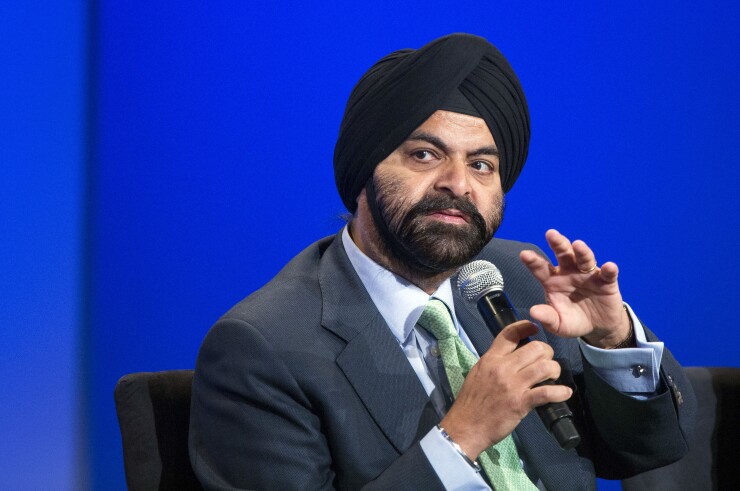Mastercard is aggressively building a business payments ecosystem as it keeps an eye on political headwinds it has little control over.
"Brexit is a daily drama being played out on television," Ajay Banga, Mastercard's president and CEO, said during Tuesday's earnings call.
Banga spent much of the call discussing Mastercard's multiyear effort to capture and deliver more data tied to supply chains, which the card brand hopes will help it gain business payments share, as well as cross-sell other B2B services.

But Brexit and the U.S.-China trade war loom. Banga did not directly tie geopolitics to Mastercard's own B2B development, but he did mention there are signs of overall worry in the business community because of political uncertainty.
Any economic slowness from political battles could affect business spending, resulting in fewer payments to process and less data to manage. Brexit, which is a moving target with at least two extensions, is a risk to overall payment technology development and the value of
The U.S.-China trade war also has a direct impact on supply chains by making some goods more expensive. At the same time, the trade war has accelerated digital payment processing for
"We are monitoring trade negotiations and there are signs of weighing on business sentiments," Banga said.
For now, Mastercard is enjoying solid performance. For the quarter that ended Sept. 30, Mastercard reported net income of $2.1 billion, or $2.07 per share, up from $1.9 billion, or $1.82 per share the prior year. The Zacks Investment Research report on 14 analysts forecasts projected EPS of $2.01. Banga spotlighted double-digital payments growth for cross-border payments, with mid-teens growth in most markets and stable growth in China in the low- double-digit range.
To maintain this performance, the card brand will rely partly on its scale to encourage adoption of standardized digital payments processing for both consumer and business payments.
Banga noted
"You'll see us do some spending on marketing, will start marketing in a bigger way when more merchants come on," Banga said, reporting overall consumer spending is relatively strong despite some moderation compared with 2018.
Mastercard's digital standards push also extends to business payments through the card brand's developing B2B hub. The card brand accelerated its business payments strategy when it acquired
B2B payments have traditionally been addressed at the point of sale, and delivering data between the buyer and seller to improve reconciliation being the new opportunity, Banga said. Security in B2B payments is another challenge Track hopes to address by building a new ecosystem.
Track is in its early stages. Banga predicts it will take three to four years to build an international ecosystem for B2B payments.
"B2B is a fragmented market and bringing it together will take years to get to fruition. You start building with what you got," Banga said.
Mastercard will use this hub to boost new faster payment features such as payment on delivery, which allows supply chain sellers to receive instant payment when products arrive at their clients. PNC is the first bank to pilot this service in the U.S., Banga said.
Mastercard has also extended B2B relationships with other banks, including Bank of Hawaii and BofA, which will use the card brand's business payments hub.
"This can address business payments by addressing both accounts payable and accounts receivable, by operating in a known set of standards with a single connection," Banga said.





